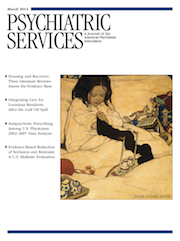Recovery Housing: Assessing the Evidence
Abstract
Objective
Recovery housing is a direct service with multiple components that provides supervised, short-term housing to individuals with substance use disorders or co-occurring mental and substance use disorders. It commonly is used after inpatient or residential treatment. This article describes recovery housing and assesses the evidence base for the service.
Methods
Authors searched PubMed, PsycINFO, Applied Social Sciences Index and Abstracts, Sociological Abstracts, and Social Services Abstracts. They identified six individual articles from 1995 through 2012 that reported on randomized controlled trials or quasi-experimental studies; no reviews or meta-analyses were found. They chose from three levels of evidence (high, moderate, or low) based on benchmarks for the number of studies and quality of their methodology. They also described the evidence of service effectiveness.
Results
The level of evidence for recovery housing was moderate. Studies consistently showed positive outcomes, but the results were tempered by research design limitations, such as lack of consistency in defining the program elements and outcome measures, small samples, and single-site evaluations, and by the limited number of studies. Results on the effectiveness of recovery housing suggested positive substance use outcomes and improvements in functioning, including employment and criminal activity.
Conclusions
Recovery housing appears to be an important component in the continuum of care for some individuals. However, replication of study findings with greater specificity and in more settings is needed.



